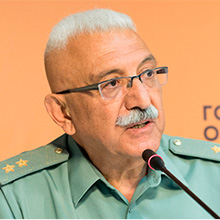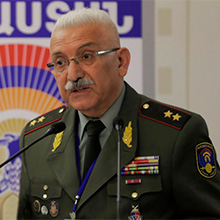
Russia-Turkey Relations after the Karabakh War: A View from Armenia  By Benyamin Poghosyan, PhD, Chairman, Center for Political and Economic Strategic Studies
By Benyamin Poghosyan, PhD, Chairman, Center for Political and Economic Strategic Studies
Russia – Turkey relations are probably among the most discussed topics of Eurasian geopolitics. Experts and pundits are frantically searching for the correct terms to describe them – cooperation/competition, the marriage of convenience, and frenemies – all these words are used in endless efforts to grasp reality beneath the surface of high-level meetings and smiley handshakes of the leaders. The two countries interact in different regions – Middle East, Northern Africa, Black Sea basin, Central Asia, Western Balkans, and South Caucasus. In all these areas, they have overlapping and colliding interests, which have created a complex web of relationships. READ MORE
- EGF Editor |
Published on EGF: 27.06.2021
| External Relations
-
The Architecture of an Innovative Strategic Union Russia-Armenia  Hayk Kotanjian, Lieutenant General (ret), Professor of RA, RF, USA (strategic security studies), Lazarev Club Board Member
Hayk Kotanjian, Lieutenant General (ret), Professor of RA, RF, USA (strategic security studies), Lazarev Club Board Member
The strategic emphasis of the 4th session of the Lazarev Club has been imperatively demanded by the need to find and pursue new ways to prevent the loss of the Armenian national statehood. The end-product of those efforts should be built upon the coincidence of the strategic interests of security and sustainable development of our two fraternal peoples and allied states - Russia and Armenia. The existential importance of brainstorming on the problem of life and death of the state, as well as its innovative development, was exacerbated by the challenge of the upcoming formation of new authorities following the results of the early parliamentary elections. READ MORE
- EGF Editor |
Published on EGF: 27.06.2021
| External Relations
-
Armenia's June Elections May Lead to Further Uncertainty and Instability  By Benyamin Poghosyan, PhD, Chairman, Center for Political and Economic Strategic Studies
By Benyamin Poghosyan, PhD, Chairman, Center for Political and Economic Strategic Studies
Sunday's parliamentary elections in Armenia are hotly contested, and the electorate is actively engaged in the campaigning. But the election is likely to lead to further uncertainty and continued instability.
The official campaign for the 20 June 2021, early parliamentary elections in Armenia started on 7 June 2021. Twenty-five political entities are contesting the elections – 21 parties and four alliances (blocs). No election in the modern history of Armenia has seen such quantity and diversity of contenders. However, despite this impressive number, only a few participants have a real chance to overcome the threshold to enter Parliament – 5 percent for parties and 7 percent for alliances. READ MORE
- EGF Editor |
Published on EGF: 16.06.2021
| External Relations
-
The Inexorable Drive for Socio-Political Reforms in Uzbekistan  By Eldor Tulyakov, Executive Director, Development Strategy Center, Tashkent
By Eldor Tulyakov, Executive Director, Development Strategy Center, Tashkent
In 2016, Uzbekistan's reform agenda's fresh and rather sudden trajectory focusing on political and socio-economic development brought a welcome surprise to much of the international community. Newly elected President, Shavkat Mirziyoyev, rapidly initiated policies based upon the principles of pragmatism and transparency — a shift well received by foreign governments, international organizations, and citizens alike and viewed as a watershed change in a country largely closed to the outside world since independence was obtained in 1991. A new vision of what will define Uzbekistan for future generations emerged, new horizons that will bring long-sought-after potential and opportunities to its people. READ MORE
- EGF Editor |
Published on EGF: 21.05.2021
| External Relations
-
Armenia and Azerbaijan Should Restore their United Nations Recognized Borders  By Lieutenant General (Ret.) Hayk Kotanjian, D.Sc., Full Professor (Strategic Security Studies)
By Lieutenant General (Ret.) Hayk Kotanjian, D.Sc., Full Professor (Strategic Security Studies)
The dynamics of the peace and war in the region surrounding Armenia attracts the keen attention of all actors promoting their international security interests in the explosive geostrategic space of the Greater Middle East.
In this context, the resolution of the border dispute in Syunik, and the issue of delimitation and demarcation of the borders between Azerbaijan and Armenia, which is the focus of international attention, requires academic and expert assessment of the legality to consider the current line of contact between the Armed Forces of the Republic of Armenia and the Republic of Azerbaijan as the starting point in the negotiations. The negotiating parties and the OSCE Minsk Group Co-Chair states - the Russian Federation, the United States and France - should take into account the evidence of the following internationally valid arguments. READ MORE
- EGF Editor |
Published on EGF: 19.05.2021
| External Relations
-
Big Armenian Decisions on Future Relations with Azerbaijan  By Benyamin Poghosyan, PhD, Chairman, Center for Political and Economic Strategic Studies
By Benyamin Poghosyan, PhD, Chairman, Center for Political and Economic Strategic Studies
Relations with Azerbaijan will be the key foreign policy issue faced by the new government, regardless of the outcome of the forthcoming parliamentary elections. Big decisions on future relations with Azerbaijan will have to be taken soon after the new Armenian government is formed after the 20 June elections.
On 10 May 2021, the Armenian Parliament did not elect a prime minister for the second time in a row. According to the Armenian constitution, Parliament was dissolved, and the President signed a decree to hold snap parliamentary elections on 20 June 2021. It is not easy to predict the precise results of the elections. However, we may assume that Armenia will not have a single-party government after the elections. READ MORE
- EGF Editor |
Published on EGF: 18.05.2021
| External Relations
-
“All against All” or “All against Nikol”?  By Benyamin Poghosyan, PhD, Chairman, Center for Political and Economic Strategic Studies
By Benyamin Poghosyan, PhD, Chairman, Center for Political and Economic Strategic Studies
Alliances are being formed between Armenian political parties ahead of the 20 June parliamentary elections. Whilst they all claim to want to oust current prime minister Nikol Pashinyan, they are all also busy competing against each other. Despite this, the next Armenian government is likely to be a coalition government.
As Armenia approaches the snap parliamentary elections scheduled for 20 June 2021, the political parties are making final arrangements to form alliances and clarify their positions. The incumbent Prime Minister, Nikol Pashinyan will participate in the elections with his “Civic Contract” party. The second and the third Presidents of Armenia – Robert Kocharyan and Serzh Sargsyan have also clarified their positions. READ MORE
- EGF Editor |
Published on EGF: 12.05.2021
| External Relations
-
Armenia’s Reformers Struggle On  By Armen Grigoryan, Vice-president, Yerevan-based Centre for Policy Studies
By Armen Grigoryan, Vice-president, Yerevan-based Centre for Policy Studies
After last year’s war, hopes that the 2018 revolution will fulfil its promise are fading – but it’s not too late for change.
“A stellar performance in one year is no guarantee of future success,” declared The Economist after Armenia held free and fair elections three years ago. The qualified praise was not without cause. It was always likely that Armenia’s attempts at democratic consolidation would be difficult, particularly because of the need for some unpopular reforms. Prior to the December 2018 parliamentary elections, observers noted that civic demobilisation – the influx of non-profit sector professionals to the government and their ensuing unwillingness to criticise it – could potentially undermine political pluralism, enable re-emergent authoritarianism, or foster the rise of right-wing populism. READ MORE
- EGF Editor |
Published on EGF: 05.05.2021
| External Relations
-
The EU Will Not Act as a Counterweight to Russia in Either Armenia or NKR  By Benyamin Poghosyan, PhD, Chairman, Center for Political and Economic Strategic Studies
By Benyamin Poghosyan, PhD, Chairman, Center for Political and Economic Strategic Studies
The EU is neither willing nor capable of countering Russia or Turkey in Armenia and Azerbaijan and will not make efforts to decrease Russian influence in Armenia and the unrecognised Nagorno Karabakh Republic.
EU-Armenia relations entered a new phase in 2009 when the EU launched its Eastern Partnership Initiative. Armenia successfully negotiated an Association Agreement with the EU and was going to sign it in autumn 2013. The growing tensions between Russia and the West forced Armenia to cancel the signature, not to ruin relations with its strategic ally. Armenia and the EU started a new round of negotiations in late 2014, culminating with the signature of the Comprehensive and Enhanced Partnership Agreement (CEPA) in November 2017. READ MORE
- EGF Editor |
Published on EGF: 05.05.2021
| External Relations
-
The Realistic Policy of Armenia towards Nagorno-Karabakh  By Benyamin Poghosyan, PhD, Chairman, Center for Political and Economic Strategic Studies
By Benyamin Poghosyan, PhD, Chairman, Center for Political and Economic Strategic Studies
The 2020 Karabakh war has dramatically changed the geopolitical status quo in the South Caucasus. Discussions have been underway in Armenia and the Armenian Diaspora about the reasons for the catastrophe and those responsible. Most probably, military defeat will be a key topic during the upcoming June 2021 snap parliamentary elections. The thorough analyses of what happened before, during, and after the war are mandatory tasks to be fulfilled. However, the key for Armenia now to elaborate a new policy towards the Karabakh conflict, taking into account the war results. The most significant issue here is to develop a realistic policy based on accurate calculations, Armenia’s resources, and the interests of external players; otherwise, Armenia may face another catastrophe. READ MORE
- EGF Editor |
Published on EGF: 28.04.2021
| External Relations
-
